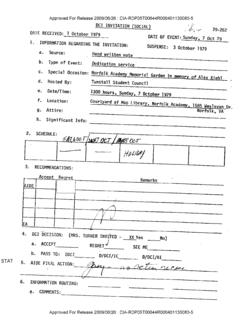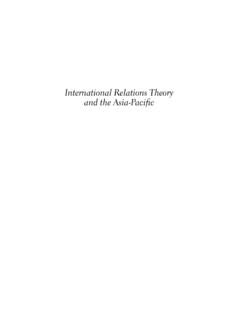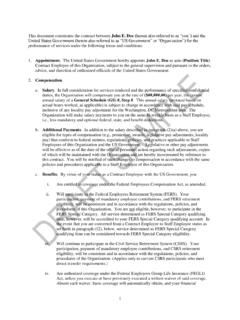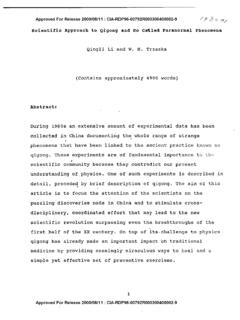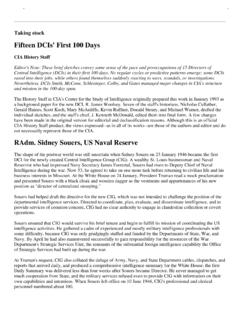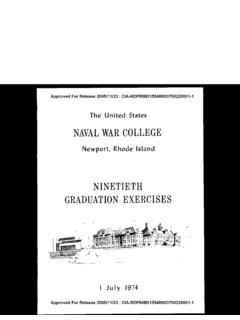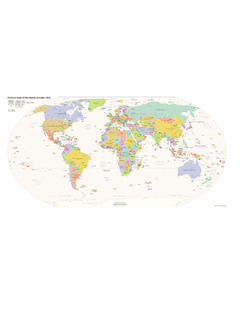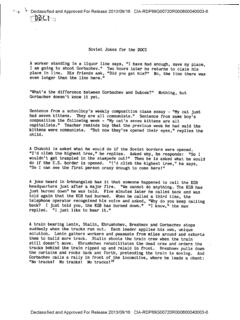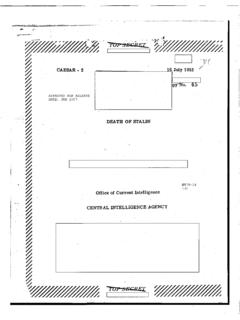Transcription of The CIA’s Updated Executive Order 12333 Attorney General ...
1 The CIA s Updated Executive Order 12333 Attorney General Guidelines Timely, accurate, and insightful information about the activities, capabilities, plans, and intentions of foreign powers, organizations, and persons, and their agents, is essential to informed decision-making in the areas of national security, national defense, and foreign relations. Collection of such information is a priority objective that the Central Intelligence Agency (CIA) pursues in a vigorous, innovative, and responsible manner that is respectful of the principles upon which the United States was founded, and consistent with the Constitution and applicable statutes and Presidential directives authorizing the CIA s activities, including the National Security Act of 1947, the Central Intelligence Agency Act of 1949 (CIA Act), and Executive Order 12333 , United States Intelligence Activities. Under Executive Order 12333 , the CIA s collection, retention, and dissemination of information concerning United States persons in furtherance of its intelligence mission are governed by procedures approved by the Director of the CIA and the Attorney General , after consultation with the Director of National Intelligence.
2 In addition, any participation by CIA officers in organizations in the United States without the disclosure of CIA affiliation occurs only in limited situations in accordance with established and approved procedures. Collectively, these procedures are often referred to as the Attorney General Guidelines. In January 2017, the Director of the CIA and the Attorney General Updated the CIA s Attorney General Guidelines to reflect changes in law, technology, and practice since the Attorney General Guidelines were last significantly Updated in the 1980s. This fact sheet explains and summarizes several key provisions of the revised Attorney General Guidelines. While the revised Attorney General Guidelines provide the framework for ensuring that the CIA engages in its foreign intelligence, counterintelligence, and covert action missions in support of national security objectives in a manner that respects Americans privacy rights and civil liberties, it is critical to note that the Attorney General Guidelines represent only one aspect of the authorizations and restrictions on the CIA s intelligence activities.
3 The CIA s activities are primarily focused outside the United States, but they must nonetheless comply with a variety of other United States laws, including but not limited to, the National Security Act, the CIA Act, the Foreign Intelligence Surveillance Act, and the Privacy Act, as well as Executive Order 12333 and Presidential directives such as Presidential Policy Directive 28. These Attorney General Guidelines do not, and should not be interpreted to, authorize activities that are otherwise prohibited by United States law. In addition to the Attorney General Guidelines, the CIA has internal regulations that govern CIA s intelligence activities. These internal regulations require various levels of approvals to initiate particular intelligence activities and may impose additional requirements on the conduct of such activities. If duly authorized intelligence activities include collecting information concerning United States persons, participating in organizations in the United States, or other areas governed by the Attorney General Guidelines, then CIA employees must comply with both these internal regulations and the requirements found in these Attorney General Guidelines.
4 2 Authorization, Purpose, and Key Limitations Sections 1 through 3 of these revised Attorney General Guidelines explain the purpose of the Attorney General Guidelines, summarize the authorities and responsibilities of the CIA, and identify several General principles that apply to the CIA s intelligence activities overall. The CIA is authorized by statute and directed by the President to collect intelligence through a variety of means, including from human sources. In short, the CIA conducts espionage. The CIA is, however, also an all-source intelligence agency that collects and incorporates intelligence information from a variety of other sources and methods to produce all-source analysis. CIA intelligence includes information ranging from relevant publicly available information (referred to as Open Source Intelligence, or OSINT) to Geospatial Imagery Intelligence (referred to as Imagery, or GEOINT), Measurement and Signature Intelligence (MASINT), and Signals Intelligence (SIGINT).
5 While statutes and Executive Order 12333 provide the General authority for the CIA to conduct intelligence activities, the CIA does not independently determine its intelligence collection priorities. The CIA s intelligence activities are instead conducted in response to intelligence requirements established by the President and the CIA s other intelligence consumers. Specifically, the Director of National Intelligence approves the National Intelligence Priorities Framework (NIPF), which establishes national intelligence priorities that reflect the guidance of the President and the National Security Advisor with input from Cabinet-level and other senior government officials. The CIA s duly authorized intelligence activities are conducted in response to the NIPF priorities or other intelligence requirements imposed by the President and other intelligence consumers. Under the framework established by Executive Order 12333 , the CIA s intelligence activities are primarily focused outside the United States.
6 The FBI is responsible for coordination of clandestine collection of foreign intelligence through human sources or human-enabled means and counterintelligence activities inside the United States. The CIA can, however, generally cooperate with the FBI to collect foreign intelligence within the United States, subject to the restrictions imposed by statute, Executive Order 12333 , the Attorney General Guidelines, and other legal and policy requirements. Specifically, the National Security Act prohibits the CIA from exercising police or subpoena powers or otherwise engaging in law enforcement or internal security functions, with the exception of the security protective officers who protect CIA facilities within a limited jurisdiction pursuant to the CIA Act. If, for example, the FBI has a cooperative relationship with an individual inside the United States who provides foreign intelligence information, the FBI may appropriately consult with the CIA regarding the relationship, and the CIA may continue the relationship for intelligence purposes should the individual travel overseas.
7 The CIA is also obligated to report to the Department of Justice potential violations of federal criminal law by employees and potential violations of certain federal criminal laws by non-CIA personnel that it incidentally acquires while seeking foreign intelligence information. For example, if in the course of collecting foreign intelligence information about an adversarial foreign government leader, the CIA learned that a United States citizen were engaged in trafficking controlled munitions or technology to the foreign government, the CIA must report that information to the Department of Justice as a potential violation of federal criminal law. 3 Executive Order 12333 recognizes that in conducting its authorized activities the Intelligence Community, including the CIA, will collect, retain, and disseminate information concerning United States persons, but requires that such activities be conducted in accordance with the limitations set forth in the Order and in conformance with the Attorney General Guidelines.
8 For instance, the Intelligence Community must use the least intrusive collection techniques feasible when collecting information within the United States or directed against United States persons abroad. In addition, the CIA may not collect or maintain information for the sole purpose of monitoring the lawful exercise of rights secured by the Constitution or United States law, including First Amendment rights. For example, the CIA could not collect the public statements of or about a United States person merely because he or she was making critical statements regarding the United States government. If, however, the CIA were collecting intelligence information about a United States person engaged in international terrorism, the CIA would not have to ignore or remove from its systems public statements made by that individual, because the collection occurred during the course of a duly authorized intelligence activity.
9 The explicit recognition of this principle in the Attorney General Guidelines reflects the CIA s enduring commitment to operate in accordance with the United States Constitution and other law. Collection Targeting United States Persons Section 4 of the Attorney General Guidelines governs the CIA s collection efforts when they are directed at United States persons. As previously described, collection directed at United States persons may only be conducted in the course of a duly authorized intelligence activity. Collection against a United States person must employ the least intrusive techniques feasible that will still obtain the required information in a reliable and timely manner. More intrusive techniques require higher-level approvals within the CIA and, at times, by other government officials and the judicial branch and must be documented in writing. The Attorney General Guidelines break down collection techniques into three categories.
10 Basic collection generally involves the least intrusive types of collection. Basic collection includes the collection of publicly available information ( , searching the public internet to determine the significance of a United States phone number recovered from a known terrorist s cell phone) or collecting information with the consent of the United States person in question ( , asking them directly for information about themselves). Because the collection of these kinds of information do not represent a significant intrusion on an individual s privacy rights, and in certain circumstances involve no such intrusion at all, the Attorney General Guidelines do not require special approvals for this type of collection. However, any such collection must still be conducted in accordance with the restrictions in these Attorney General Guidelines and other agency policies. Basic collection must be for an authorized purpose, such as foreign intelligence or counterintelligence, and limited to information reasonably necessary to support that purpose.
